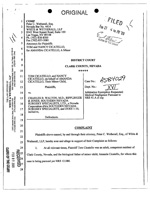
Amanda Cicatello, then 15, was undergoing an appendectomy on March 15, 2008, when the surgeon punctured her aorta, causing her to bleed into her stomach cavity. Surgery to fix the aorta left a scar from her breastbone to below her navel. She remains self-conscious about her body and suffers bouts of depression.
Sunday, Sept. 19, 2010 | 2 a.m.
Do No Harm: Amanda Cicatello
When Amanda Cicatello was 15, a surgeon accidentally punctured her aorta with a surgical instrument during an operation to remove her appendix. She nearly bled out and died on the operating table.
Do No Harm: Hospital Care in Las Vegas, Part 3
- Patients at risk under the knife
- Routine surgery, harrowing result
- A cry for help
- Doctors avoid discipline
- Colorado transparency unique
- Last drumroll
- How the Sun identified surgical injuries
Share your stories
Amanda Cicatello appears in some ways to be a typical teenager. Her bedroom is whimsically decorated with a zebra-striped bedspread and a stuffed panda. She works at a trendy clothing store and loves to hang out with friends.
Yet when Amanda, 18, describes the nearly three-year ordeal since her aorta was punctured during surgery, she sounds like a woman aged beyond her years.
"It stays with you," she says of the incident that nearly claimed her life. "I'm physically healing, but it takes even longer to emotionally heal."
Amanda and her parents are suing the surgeon, Dr. Charles Walton.
The injury occurred March 15, 2008, when Amanda underwent a laparoscopic appendectomy at St. Rose Dominican Hospitals — San Martin Campus.
Dr. Kenneth Deck, a California physician working as an expert witness for the plaintiffs, said Walton did not properly position an internal camera when he inserted a trocar — a sharp surgical device used to penetrate the abdomen. Deck said that resulted in the injury to the aorta — the body's largest artery, descending from the left ventricle of the heart to the abdomen.
Blood jetted from the wound with every heartbeat.
"I started to bleed out in my stomach cavity," Amanda says.
Walton immediately opened Amanda, then 15, from her breastbone to below her navel and, with the assistance of another surgeon, repaired the wound. Amanda was given multiple blood transfusions.
Walton, who did not comment for this story, said in a deposition that he did not violate acceptable standards of care.
The injury occurred in part because his preferred trocar wasn't on hand, he said in the deposition. He said he requested it, but rather than "waste time waiting" he went ahead with the procedure. Using an unfamiliar trocar, the surgeon pushed too hard, plunging it through one side of Amanda's aorta and out the other.
Walton said he knew Amanda and her family were devastated. The operating-room staff was upset, and he was too, Walton said.
"Not very often do I damage someone," he said, adding that he had apologized for the injury.
Despite suffering the effects of the incident, Amanda describes it with detachment, as if it wasn't her on the operating table.
That detachment quickly dissolves when she discusses the worry her parents felt in the waiting room as what should have been a 45-minute procedure stretched to almost three hours.
Sensing something was wrong, Tom Cicatello, Amanda's father, hunted down a nurse and pressed for details. She acknowledged there had been a complication, but said everything was "fine." Amanda's mother, Nancy, raced to the restroom, where she threw up and collapsed, weeping.
Walton was apologetic, Cicatello says. "I could tell he was distraught and upset. I believe he's probably a decent man and a decent surgeon. But he was obviously negligent."
When they finally saw Amanda, she was in critical condition and breathing with the assistance of a ventilator. A one- to two-day hospital stay was instead 10 days, followed by six weeks of bed rest.
"It was just a nightmare," Cicatello says.
St. Rose officials said they could not speak specifically about the lawsuit, but said the hospital investigates potential adverse events and takes action to ensure the safety of patients. Physician performance is reviewed, and doctors are disciplined if necessary, the hospital said in a statement.
Amanda suffers migraines and anxiety related to the emotional trauma. She gets sick often and is afraid to visit a doctor or go near a hospital.
There are other lingering effects. Like many teenage girls, Amanda is self-conscious about her body. The long scar that spans her abdomen has only made that worse. The few people who have seen it made rude comments, she says. "Did you get a C-section?" one said.
She used to take belly-dancing classes before the surgery but has since quit. She would like to wear a two-piece bathing suit. Her dad even bought her an expensive bikini that "looked cute and still covered my scar," but she says she is too self-conscious to wear it. She avoids the pool.
The family says they understand how important it is for the public to know about the training and track records of physicians who treat them. But they realize there is little public information.
"I completely understand and am sympathetic that people make mistakes and things happen," Amanda says. But "if you're not going to follow procedure and almost kill me and affect my life, then that's when it's not OK. It should be OK for people to see that information."




Join the Discussion:
Check this out for a full explanation of our conversion to the LiveFyre commenting system and instructions on how to sign up for an account.
Full comments policy